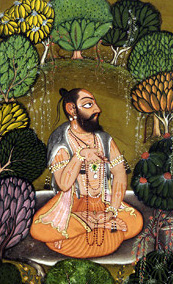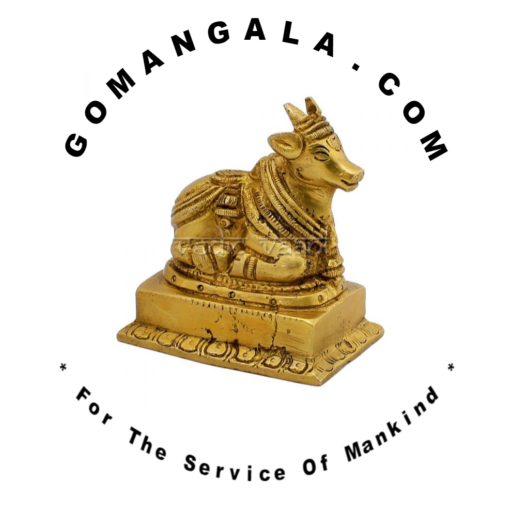In Mahbharat, Pauloma parva is the fourth upa parva, under the first maha parva, named as the Adi parva. Maha parva means parts of the epic, the main book of Mahabharat, and upa parva means sub divided volumes. Mahabharat was authored by Veda Vyasa Rishi and he told the entire epic to his son Shuka Muni in eighteen parts with an appendix or in total say, one hundred sub divisions. Suta Puranika had heard the narrations, when he had attended the serpents’ yajna performed by Janamejaya, where the epic was retold by Shuka muni to the audience assembled there.
After completion of the yajna, Suta Puranik, while returning, had visited the hermit of Ugrashrava , son of Lomaharshana, at Naimisharanya. Ugrashrava had requested Suta Puranik to narrate the same epic. Thus three upa parva was completed. He started to narrate the fourth upa parva, the pauloma parva. After accepting the provisions of due hospitality, the story teller, Suta Puranik upheld the lesson of this upa parva being the highest virtue as non- violence, as adorable for any human being and to be longed for that root principle of Dharma.

Shaunaka’s predecessors were also story tellers, Suta had explained about their ancestors.
Suta Ugrashrava had conducted the rituals for twelve years in Naimisharanya and many sages had attended the Satra there. The various Rishis and Suta sat in a circle and had discussed and collected the facts about Shaunaka. The grandfather of Shounaka was Shunaka Rishi. His father was Ruru and mother was Pramadvara. Ruru’s father was Pramati and mother was Ghritachi. Further, Pramati’s father was Chyavana and mother was Sukanya. His father was Bhrigu and mother was Puloma. Bhrigu was created by Brahma as equal to himself.
Puloma had married Bhrigu Rishi but one demon wanted to marry her. The Rakshasa or demon also had the same name, Puloma. After a few months, the wife of Bhrigu Rishi, the lady Puloma had become pregnant and one day Bhrigu had to go out to attend his professional obligations. The demon Puloma had understood the absence of Bhrigu and came near the hermit with decent dress codes resembling like a king. When smoke emitted from the hermit, he could guess about the presence of fire inside the hermit. So he entered inside the hermit and found the burning fire. The lady Puloma treated the guest as per Atithi Dharma. The crooked demon then throwing away his dress like a boar lifted the lady Puloma and started running through the forest, with very high speed, like flying on the sky.
The fire in the hermit had touched the clothes; those dresses thrown by the demon caused fire mishap which later spread as forest fire at once. The forest fire caused a blockade on the way of the demon and while the lady Puloma tried to escape, the baby had been born in the forest. The demon had died in the forest fire. Puloma had taken the baby back to her hermit and while Bhrigu had returned, they desired to name the child. In the forest, the baby had fallen initially. In Sanskrit, Chyuta means fallen. Vana means forest. Hence the name of the child was kept as Chyavana. Puloma thought the baby would have glorious future, as his birth had made her life happy in the midst of the forest fire, certainly a good omen. Chyavana had got good education and maintained good health.
The story of Chyavana is more elaborated in other upa parvas, as follows:
The son of Bhrighu, Chyavana Rishi when grown up, had started conducting penance in the forest. One day, the monarch king Sharyati had visited the same forest during hunting. His daughter Sukanya had also accompanied him. Sharyati was surrounded by soldiers and engaged in hunting but princess Sukanya enjoyed the beauty of the forest. Chyavana Rishi had been sitting in penance for a long time and anthills had grown over his body.
While wandering in the forest, Sukanya had pierced a twig into the anthill causing pain to the eyes of Chyavana Rishi. By that time, he had gained high control over the nature and he had created suffocation to the king Sharyati since he was responsible for the negligence’s committed by his daughter, Sukanya. The clever soldiers of Sharyati had found out the problems. Sharyati had begged the pardon of Chyavana Rishi on behalf of his inexperienced daughter, who had done the mistake. Chyavana plainly admitted his disability of vision problems and requirement of a manual assistance for his future life, and sympathetically discussed.
The matter had been mutually consented. Then the marriage of Sukanya with Chyavana had been agreed by all. After giving Sukanya to Chyavana , Sharyati with his army returned to his palace. Chyavana had continued his penance with the help of Sukanya and his father’s instructions were followed. Chyavana had gathered more powers. The angels, twins in nature, under the name Ashvini star groups were in charge of many medical remedies.
One day, Ashvini twins appeared before Chyavana to provide the boon to him. But they wanted to test him and his wife. They appeared as young beautiful prince boys and requested Sukanya to marry one of them and leave Chyavana. They accused Chyavana as he could not see her beauty due to his blindness. She did not agree and desired to be a constant husband worshipper always. Then they passed the tests and the Ashvini angels yielded to provide vision power to Chyavana and advised him as he was an old man, with white hairs. Chyavana got normal vision power but continued his penance as per the advice of Ashvini angels. Sukanya told Chyavana about Ashvini angel’s desire for marriage. She desired to revive the senile body of Chyavana Rishi himself. So they planned some special welfare measures.
The power of penance and the power of medical remedies had been properly controlled by Chyavana Rishi. Since he got the health of his eyes ok, he wanted to give some rewards to Ashvini angels. Chyavana had joined them by his angelical powers, so Asvini twin stars were made then as a young lady angel. Then Chyavana had become the master of medicines and Ashvini had become the bride to marry any boy only. Therefore Sukanya advised Ashvini to marry the young man possessing the most handsome face, to select the Moon on the sky. He had inserted verses in Rigveda, so that, whenever oblations are offered to Soma, the first part should go to Ashvini angels, as one of his twenty seven wives.
After marriage of Moon by Ashvini stars, both Moon and Ashvini had become happy and more boon was offered to Chyavana Rishi. The practical remedies to regain youth and health by him were started after mutual consent and blessings. Chyavana had taken bath regularly with herbal liquids. He used herbal pastes over his own body. Also, he had consumed the mixtures of certain plants and drank cow milk. He had become a young man after a few days of trials and Sukanya had achieved her desires and reported to her father, king Sharyati, regarding the retention of youth by her husband, Chyavana Rishi.
Then Chyavana had been blessed with a son called Pramati. Pramati, when grown up had married Gritachi, and they had been blessed with a son called Ruru. When Ruru had grown up, his marriage was fixed with Pramadvara. When Chyavana and Sukanya became very old, they elevated into heaven and all the wealth was easily entrusted to Ruru. Ruru enjoyed life time but could not concentrate in penance. Chyavana wished to teach Ruru the importance of virtues and penance. Pramadvara had been tied with a piece of turmeric in her right hand and Ruru had also done the same and sought the blessings of their parents for the successful completion of their marriage.
In advance of a few days of their marriage, Pramadvara had got a snake bite and death was anticipated for her. Ruru felt very sad and agreed to do anything to restore Pramadvara. Ruru had entered into the forest and started to conduct the penance alone. Then Chyavana Rishi was in the heaven and he had sent a new proposal to his grandson Ruru. Half of the balance life period of Ruru, or the Ayushya, would be donated to Pramadvara since her Ayushya account showed nil and angel of death, Yama was approaching her. Ruru donated his balance life time to his would be wife Pramadvara and hence Yama had exempted here from death.
Thus Ruru waspartially changed in his mind and understood about the power of penance. Ruru and Pramadvara married and lived happily and they had been blessed with a child, later named as Shunaka. Since Ruru had lost his life time due to snake bite to his wife, he had grown hatred towards snakes. Ruru had been taught to follow the path of non-violence by his parents but he had been teasing snakes even though some snakes were non-poisonous.
Khagama was a king classified under Kshatriya varna. Sahasrapat was a Rishi, classified under Brahmin varna. They were friends and the difference in their varna had not caused any obstacle in their friendship. They played together when they were students. But, hurting jokes and making fun sometimes dislike a friend.
One day, Khagama was meditating but Sahasrapat could not respect his meditation thinking as a friend, played a joke. With the Darba grass, Sahasrapat made an artificial snake and put it as a garland over the throat of Khagama. Due to the disturbance in penance, Khagama opened his eyes and cursed Sahasrapat to be a Dundubha, big venom-less snake. But then, Sahasrapat felt sorry and convinced him, his joyful thought should not result in havoc. But Khagama told he was helpless, unable to withdraw a curse but could be postponed. People knew Rishi Ruru was in the habit of teasing snakes. When Ruru disturbs Dundubha, then he would remember his original form as Sahasrapat and on becoming normal to advise him regarding the curse and time to be free of this curse. So Shahasrapat lived in the forest for many years as a Dundubha, waiting for Ruru.
Ruru one day passed through the same forest and saw the Dundubha. With a dart, Ruru desired to hurt Dundubha. Being a python, so far nobody had hurt him as he was venom less. Hence he remembered immediately after being hurt by the dart, Sahasrapat got human form and started to advise Ruru as:
Please Ruru, don’t hurt any living creature. A Brahmin is never entitled to take weapon in hand, like a dart, and hurt any co living creature. It is desired a Brahmin should study Vedas and teach others. He should live with peace and promote life but not to cause any sorrows to co living creatures. For more, ask your own father Pramati.
Then, Sahasrapat disappeared into heaven. Ruru went to his home and asked his father Pramati to tell about serpent’s yajna and Mahabharat. Pramati told his son regarding the serpents sacrifice and Astika who saved Takshaka and stopped it.
व्यासाय विष्णु रूपाय व्यास रूपाय विष्णवे । नमो वै ब्रह्म निधये वासिष्टाय नमो नमः ॥
Meaning: I salute to Veda Vyasa Rishi. I salute the incarnation of God Vishnu. Vishnu appears in the form of Vyasa. I salute the asset of Brahma in the form of Vishnu as well as Vyasa. Mahabharat is the boon for all where God exists and blesses. After hearing this epic, the virtues of Ruru and Pramadvara had doubled.
Next post, Mahabharat Astika parva may not be missed. Mahabharat Amshavatarana would be presented separately in another article.
Readers may provide feedback and share this story with friends and family.

0 Comments
1 Pingback